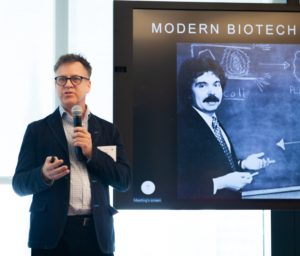

by Renata Meyer, Managing Director at Golden Seeds
August 8, 2019
There’s a bio-revolution happening, and it’s called Synthetic Biology. That was the take-home message of Karl Schmieder, MS/MFA and CEO of messagingLAB, a life sciences strategy and communications firm, in his fascinating presentation to Golden Seeds members.
“We really are entering the age of engineered, living machines”, said Schmieder, who is also the co-author of a book on the topic called What’s Your Bio Strategy? Preparing Your Business for Synthetic Biology.
In his talk, Schmieder provided some key background knowledge on the potential of Synthetic Biology, as well as an interesting peek into the future of the industry.
Let’s take a look at what he had to say about this transformational field and the opportunities it presents to investors.
Modern biotechnology has been around for almost 40 years. It’s incredible to think of how far the industry has developed during this time. As Schmieder said in his Golden Seeds talk, when the computer industry was that old, it still relied on those eight-inch, 80 KB floppy disks.
Right now, biotech is a nearly $350 billion industry which accounts for almost three percent of the U.S. gross domestic product.
However, when most people think of biotech, what immediately comes to mind is pharmaceuticals. While pharma is certainly a big part, investors who believe that biotech is limited to pharma are missing bigger, less risky opportunities.
Humans are great engineers and can build incredible things. But what we can do pales in comparison to nature, a force that can create the tiniest of microorganisms, the tallest of trees, and the incredible complexity and variety of human beings.
At its most basic, synthetic biology taps into nature’s great, almost unlimited potential. It’s all about manipulating DNA to engineer biological end-products. And, because biology exists in every environment on the planet — there is life everywhere, after all — the sky’s the limit as we get better at reading and writing it and investigate new ways to use it.
Synthetic biology has the potential to completely reinvent virtually every industry that uses chemicals and minerals to manufacture anything.
The “right-now” uses of synthetic biology are already far-reaching. There are mundane but critical ones, such as using natural organisms to create enzymes that allow detergents to work better in cold water or make the process of dyeing clothing less water-intensive. Then there are the science-fiction-sounding applications like producing silk by brewing yeast, or “growing” leather without the cow. Synthetic biology has clearly already made its mark and is becoming more and more innovative.
What’s more, even as these far-out uses become reality, synthetic biology is also making biotechnology more accessible. An innovation that may have required an advanced science degree and hundreds of millions of dollars to accomplish even just 20 years ago, can now take a few hours in a co-op lab space and hundreds of dollars, and in many cases can be outsourced.
And, innovations such as lower-cost, briefcase-sized labs and pipette robots that you can take with you are rapidly improving the ease, accessibility, and cost of scientific experimentation.
What this all means is that savvy investors who understand the transformative power of synthetic biology are faced with unlimited opportunity.
It’s estimated that over the next 30 years, the application of biological engineering to all industries will contribute significantly to creating the next $100 trillion in economic value.
These are a few major, overlapping categories of synthetic biology that are particularly interesting:
Organism and bio-circuit design: If you have an idea for a product, instead of building a lab or renting space and hiring lab personnel, you simply outsource your work to synthetic biology specialists. These companies can design organisms, scale up production and even optimize your supply chain.
Bio-fabrication: Instead of getting products from nature and animals, you can actually grow the cells that will manufacture the product. For example, instead of needing cows to make leather — which can cause pollution and require constant care — you grow leather directly in the lab.
Cellular agriculture: This includes creating protein without having to raise animals, as well as other methods to reduce the environmental impact of “raising” food.
Information storage: The most efficient storage system on earth isn’t flash or solid-state memory, it’s DNA. Right now, DNA drives can store 1 Terabyte of information. They aren’t yet as fast as a hard drive, but the industry is innovating rapidly.
The environment: It’s no secret that remediating the environment — cleaning up plastics and slowing climate change — is one of the biggest challenges that humans face. Synthetic biology is stepping up to help solve these problems. For example, one company uses methane to create truly biodegradable plastic, solving two problems at once.
There are some great synthetic biology resources and events that can help you get up to speed.
Perhaps the best place to start is by reading Schmieder’s book, What’s Your Bio Strategy? Preparing Your Business for Synthetic Biology. It provides all the basics and background, while giving relatable, real-world scenarios and advice for investors.
Once you’ve done that, look into events like the Biodesign Challenge Summit and Biofabricate, both in New York, the International Genetically Engineered Machine Competition and New Harvest conference in Boston, and the annual SynBioBeta conference in San Francisco. Or network at NewBioCity, in New York City to meet synthetic biology entrepreneurs.
Finally, find a community lab in your area. The first in the world was Genspace in Brooklyn, NY. Now there are hundreds, all over the globe. They operate on a subscription model and often offer classes and provide resources to help you learn more about the industry.
Golden Seeds is following the trend of synthetic biology with great interest — might it be the fifth industrial revolution?
Learn more about Golden Seeds.